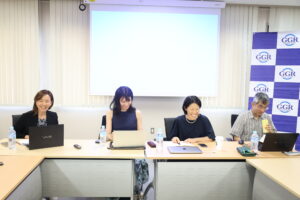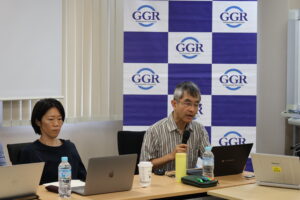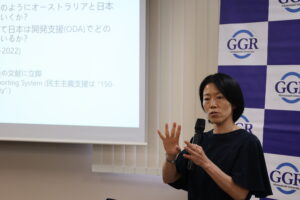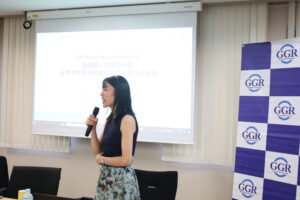On July 30, 2024, the Institute for Global Governance Research (GGR) held a brown bag lunch seminar titled “Aligning values and interests: Japanese and Australian democracy support in the Pacific and Southeast Asia” which invited three experts specializing in Japan’s Official Development Assistance (ODA) and international development. This event marked the launch of the report with the same title.
Dr. Hiroaki Shiga, a professor at Yokohama National University, opened the seminar with his analysis of how Japan’s ODA has changed under the Free and Open Indo-Pacific (FOIP) Initiative. Professor Shiga highlighted that the way in which universal values are sought has shifted from within each country to the international rule of law, reflecting a sense of crisis over the rise of China. Professor Shiga noted that the purpose of Japan’s ODA became to ensure traditional national security as a deterrence against unilateral changes in the region, with the examples of providing patrol vessels to related countries and its relevance to Official Security Assistance (OSA), which he called the “securitization of ODA.” He expressed concern about whether the current situation is good for both Japan and the recipient countries, as it may lead Southeast Asia into a vortex of military expansion and worsen Japan’s security if it is justified as defending universal values.
Next, Ms. Chikako Kodama, a Ph.D. candidate at Hitotsubashi University, made three key recommendations for Japan’s approach to democracy support in its ODA programs for Southeast Asia, based on her analysis of data covering two decades of Japan’s democracy support in Southeast Asia. First, she noted the declining trend in both the amount and the share of democracy assistance in Japan’s ODA, and argued the situation should improve if a normative purpose is added to the approach. She also noted that Japan can promote civil society and the participation of various stakeholders, including NGOs and private organizations, in recipient countries by diversifying the framework and establishing various partnerships with other countries in democracy support. Finally, she said it is necessary to carefully assess the appropriateness of development cooperation in light of the situation in each country. This can be done by drawing on the growing body of research on authoritarian countries and by promoting a robust domestic debate on how ODA should be used.
The final guest speaker, Dr. Yuki Miyoda, a research fellow at the Center for Sustainable Social Design at the University of Tokyo, provided an overview of Japanese development aid and democracy support in the Pacific. Dr. Miyoda explained that the Pacific Islands Leaders Meeting (PALM), which Japan hosts every three years, has become an increasingly important part of Japan’s diplomacy with the region. Beyond the historical and economic characteristics of Pacific countries, Dr. Miyoda narrowed her analysis of Japan’s support for democracy to three countries: Papua New Guinea (PNG), Fiji, and the Solomon Islands. She explained although the amount of ODA from Japan to these three countries is relatively small compared to Southeast Asian countries, it can have a significant impact on the recipient countries. While infrastructure projects are at the forefront of Japan’s assistance to the three countries, other project-based assistance is also provided, on which she commented that in line with the vision of the FOIP, more support for democracy and accountable governance should be provided in parallel with infrastructure.
【Event report prepared by】
Sulastri (Master’s student, School of International and Public Policy, Hitotsubashi University)
Minhee Jeong (Doctoral student, the Graduate School of Law, Hitotsubashi University)




